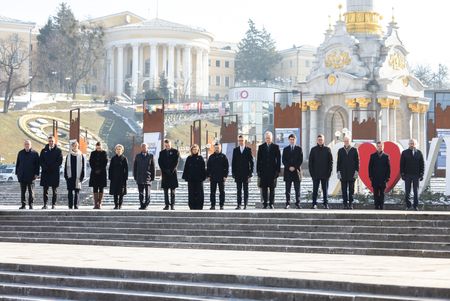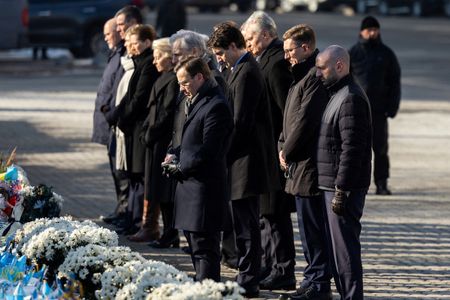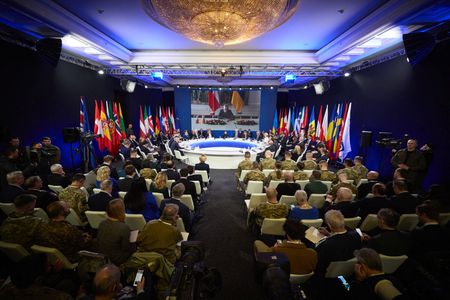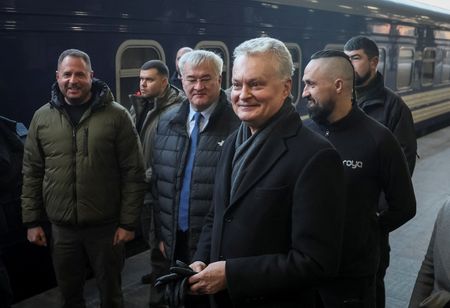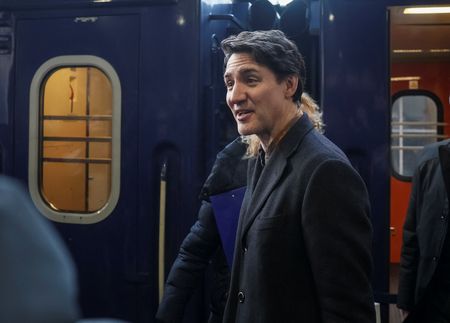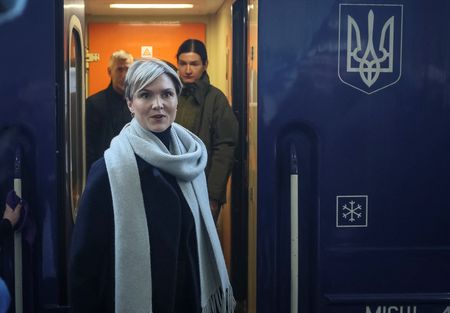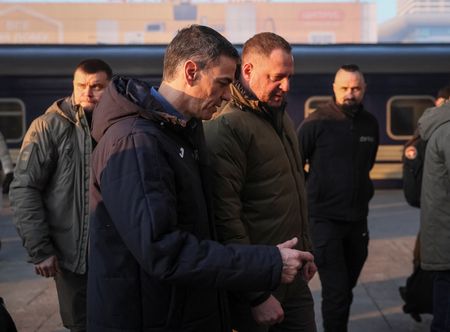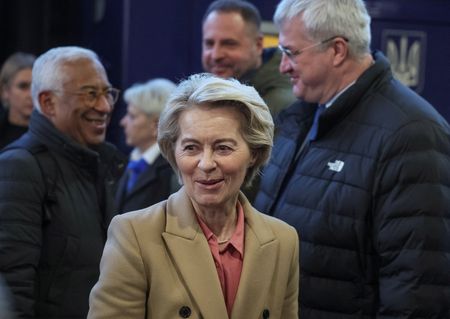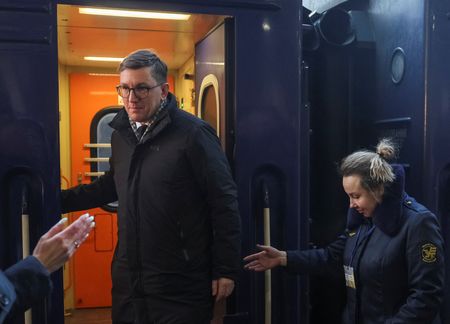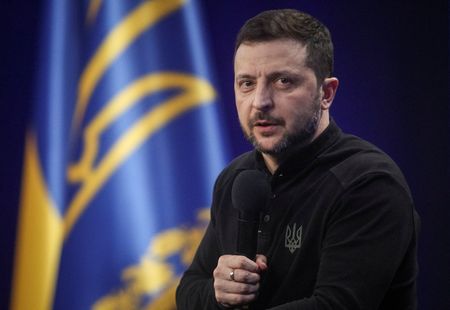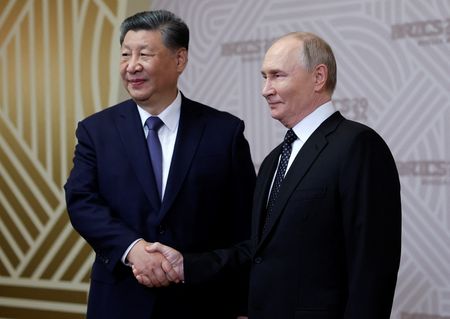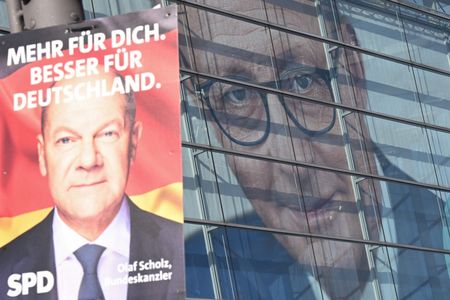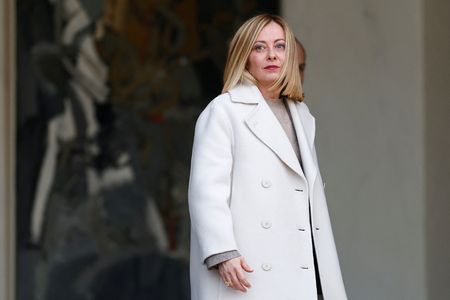By Tom Balmforth, Max Hunder and Dan Peleschuk
KYIV (Reuters) – Ukraine began its fourth year of all-out war with Russia on Monday, hosting a slew of European and world leaders for a summit, but unsure it could rely any longer on its staunchest ally, the United States.
Donald Trump denounced Volodymyr Zelenskiy last week as an unpopular “dictator” who needed to cut a quick peace deal or lose his country, while the Ukrainian leader said the U.S. president was living in a “disinformation bubble”.
Beyond the war of words, U.S. officials opened direct talks with the Russian side in Saudi Arabia last week, shutting out Kyiv and Europe in a stunning change of policy on the war.
Washington has made clear it will not send troops as a security guarantee coveted by Kyiv if a peace deal emerges, placing the burden on European powers that are likely to struggle without U.S. backing.
Zelenskiy, who has told Europe to create its own army while urging Washington to be pragmatic, has held more than a dozen phone calls since Friday, mainly with European leaders, to scope out a way forward.
“Three years after the start of Putin’s ‘three-day’ special military operation, Ukraine is alive, fighting and our country has more friends in the world than ever,” Zelenskiy told a summit of visiting leaders in Kyiv for the anniversary.
They included European Commission President Ursula von der Leyen, European Council President Antonio Costa and the leaders of Canada, Denmark, Iceland, Latvia, Lithuania, Finland, Norway, Spain and Sweden.
Albania, Britain, Croatia, Czech Republic, Germany, Japan, Moldova, the Netherlands, Poland, Switzerland and Turkey’s leaders spoke by video link. There was no immediate sign of U.S. representation.
The visitors paid their respects to Ukrainian soldiers killed in the war, standing in silence before a memorial made up of flags on Kyiv’s central square. Air raid sirens sounded as they met for talks later, though no missile strike followed.
“In this fight for survival, it is not only the destiny of Ukraine that is at stake. It’s Europe’s destiny,” von der Leyen wrote on X.
Thousands of Ukrainian citizens have died and more than six million live as refugees abroad since Russian President Vladimir Putin ordered the invasion by land, sea and air, starting the bloodiest conflict in Europe since World War Two.
Military losses have been catastrophic, although they remain closely guarded secrets. Public Western estimates based on intelligence reports vary widely, but most say hundreds of thousands have been killed or wounded on each side.
Tragedy has touched families in every corner of Ukraine, where military funerals are commonplace in major cities and far-flung villages. People are exhausted by sleepless nights of air raid sirens.
‘THEY ARE TIRED’
Russia launched 185 drones against Ukraine overnight but caused no significant damage, the Ukrainian air force said. Kyiv said it had hit Russia’s Ryazan oil refinery, continuing its campaign to degrade its enemy’s energy infrastructure.
Ukrainian troops face a numerically superior foe as questions swirl over the future of vital U.S. military assistance. It is unclear how much European allies could fill the gap if U.S. support slows or stops.
Evhen Kolosov, head medic at an army stabilisation point for Ukraine’s Spartan brigade that is fighting in the east, said the troops were psychologically worn down.
“They’re fighting on but really those (who’ve been here) since the first days are tired, even more psychologically than physically, in the same way as medics. It’s difficult, but this is war, who said it would be easy?”
Pavlo Klimkin, Ukraine’s foreign minister from 2014 to 2019, said Zelenskiy needed to try to preserve strategic ties with Washington while enhancing relations with Europe, as well as reaching out to countries like China and India.
Klimkin said he did not think relations with Washington had reached crisis point yet, despite Trump’s outbursts.
“A tornado is not sustainable, it will pass, but it is very important not to feed it in any way.”
He did not anticipate a peace deal this year that would meet Ukraine’s ambitions for something fair and lasting, but said there could be elements of a ceasefire agreement.
At the heart of the U.S. relationship is a deal under discussion that could open up Ukraine’s mineral wealth to the U.S., with Trump seeking hundreds of billions of dollars to repay Washington for its support.
Zelenskiy refused to sign an draft deal earlier this month, protesting that it was not in Ukrainian interests and did not contain the security guarantees he wanted.
A senior Ukrainian official said on Monday that negotiations with the United States on a minerals deal were in their final stages and that nearly all the key details had been finalised.
Reuters reported that U.S. negotiators pressing for a deal had raised the possibility of cutting Ukraine’s access to Elon Musk’s Starlink satellite internet system, which has played a vital role in Kyiv’s military operations.
Trump has pressed Ukraine to hold a wartime election, appearing to side with Russia which has long described Zelenskiy as no longer legitimate.
Zelenskiy’s mandate was due to expire last May, but no election has been held due to martial law, which was declared at the start of the invasion and prohibits holding elections.
Zelenskiy said on Sunday he was willing to give up the presidency if it meant peace, quipping that he could exchange his departure for Ukraine’s entry into NATO.
(Additional reporting by Yuliia Dysa, Olena Harmash, Vitalii Hnidyi; Editing by Mike Collett-White, Gareth Jones and Ros Russell)

